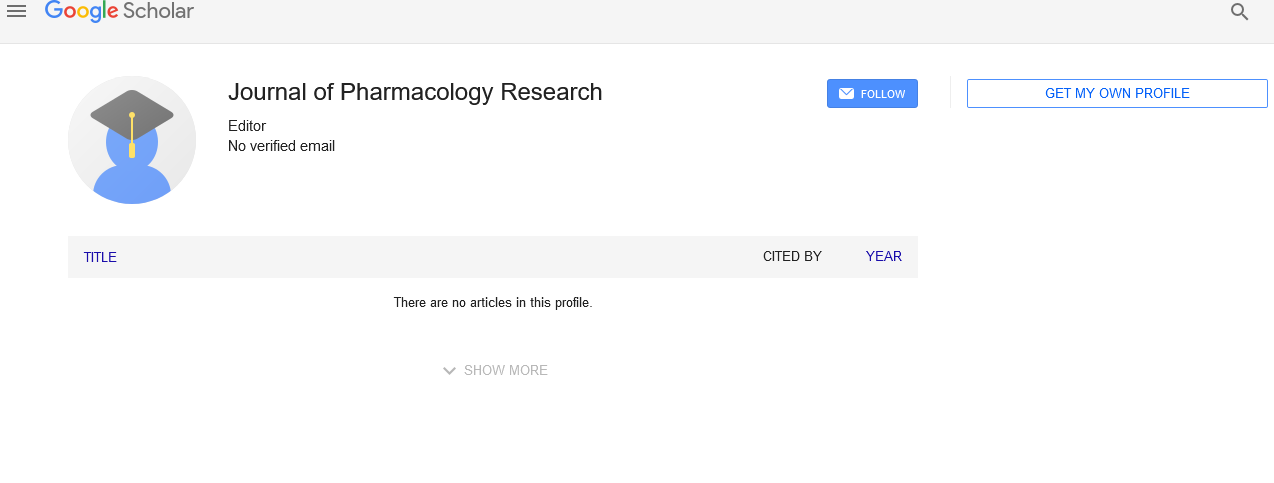A basic introduction to clinical pharmacology
Received: 03-Dec-2021 Accepted Date: Dec 17, 2021; Published: 24-Dec-2021
Citation: Yu H Abasic introduction to clinical pharmacology. J Pharm Res. 2021; (6);1.
This open-access article is distributed under the terms of the Creative Commons Attribution Non-Commercial License (CC BY-NC) (http://creativecommons.org/licenses/by-nc/4.0/), which permits reuse, distribution and reproduction of the article, provided that the original work is properly cited and the reuse is restricted to noncommercial purposes. For commercial reuse, contact reprints@pulsus.com
Description
Clinical pharmacology is defined as "the discipline that teaches, conducts research, develops policy, provides information and advice on the effects and proper use of medications in humans, and implements that knowledge in clinical care." Clinical pharmacology's fundamental goal is to generate data for the most effective use of drugs and the practice of "evidence-based medicine." Clinical pharmacologists have medical and scientific knowledge that allows them to evaluate evidence and generate new information through well-designed investigations. Clinical pharmacologists must have enough outpatients to provide clinical treatment, teach and educate, and conduct research, and also be monitored by medical professionals. Analyzing adverse drug effects, therapies, and toxicology, including reproductive toxicology, cardiovascular hazards, perioperative drug management, and psychopharmacology, are just a few of their responsibilities to patients. Data analysis skills are also provided to modern clinical pharmacologists. Modeling and simulation techniques, such as population analysis and non-linear mixed-effects modeling, could be used to analyze data.
Plant and animal resources have been used for medicinal purposes since prehistoric times. China, Egypt, and India, for example, had written evidence of their early traditional treatments of various forms. Some of these remedies are still considered beneficial in today's society, but the majority has been rejected because they were ineffective and potentially hazardous. Attempts to develop medical methods were made on a regular basis during the 1500s. Schools were established to teach these advancements, but none of these methods proved to be effective, resulting in the dominance of a school of thought that claimed to explain all about biology and disease without depending on experimentation. These colleges would invent unique procedures that they thought would cure disease and harm. They believed that if an ointment was applied to a weapon's wound, it would heal, and that disease was caused by too much bile and blood in the human body. Theoretical medicine was left aside and forgotten around the 17th century, and people began to practice medicine based on analysis and experimentation. Physicians began to apply these new techniques to their own culture's traditional medications and treatments. The sciences of drug manufacturing and use began to develop about this time, however they still lacked means to test some of their ideas about how medications operated in the body. François Magendie and his student Claude Bernard developed experimental physiology and pharmacology procedures in the late 18th and early 19th centuries. Advances in chemistry and physiology were made from the late 18th century to the early 20th century, providing a basis for understanding pharmaceuticals at the organ and tissue level. Manufacturers were able to develop and sell medicine that they claimed was authentic but was worthless owing to technological advancements at the time.
These assertions could not be validated until around 60 years later, when reasonable therapeutic principles were re-established in medicine. Around the same period, considerable biological development and growth occurred. As soon as new methodologies and concepts were developed, data on biological substrates and drug motions began to accumulate. Many new and some old drug groups have been introduced in the recent half-century. With the study of the molecular bases of therapeutic action, there has been even more rapid progress in the previous three decades. This new information has aided in the identification of the molecular mechanisms of several dugs, as well as the separation and cloning of receptors. These techniques aided in the numerous receptor discoveries. Pharmacology's scientific principles are expanding today.





